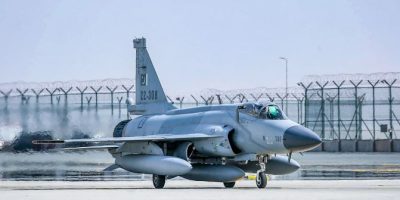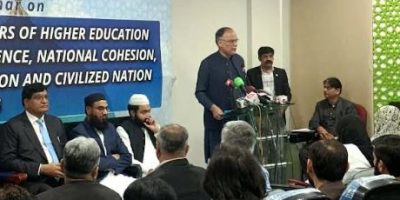Pakistan’s participation in Moscow Format- a shift in its policies or reaction to Taliban’s hate

Shamim Shahid
Amidst growing tension with the Taliban regime, over border travelling restrictions, Pakistan has adopted a unique policy towards war devastated Afghanistan. On one hand, Pakistan has endorsing global community’s reservations over Taliban policies especially restrictions against women, growth in opium production and others but on the other it insisting the international community for extending maximum support to Taliban regime. Even, Pakistan still confirms that, “footprint of terrorist organizations in Afghanistan, has yet to be fully eradicated,” remarked Pakistan’s Special Envoy to Afghanistan Muhammad Sadiq Khan while addressing the 4th Meeting of the Moscow Format Member States at Moscow Russia on Wednesday.
The summit attended by a number of countries, considered stakeholders to long standing conflict in Afghanistan has discussed in depth current situation of that country, which despite tall claims on the part of global community still ahead with un-ending internal hostilities and external plots and aggressions. The conference held after two days of armed clashes in Chaman, Baluchistan considered second most busy crossing point between Pakistan and Afghanistan. As a result of tension erupted with losses to precious human lives from both sides in encounter, all sort of travelling and economic are on halt from last several days. Hundreds of million rupees fresh fruits and vegetables, loaded in trucks have been gotten, thus further fuelling hate and anger amongst the local traders from both sides.
Sadiq Khan considered most experienced diplomat, especially on Afghanistan in his well explained presentation before participants of Moscow Format has pointed out, “Pakistan is a firm adherent to the primacy of a regional approach to the situation in Afghanistan. We believe that the Moscow Format advances this goal, by bringing together the regional countries in a process of meaningful dialogue and engagement on Afghanistan. We met in Moscow last year at a time of great flux – the precipitous withdrawal of international forces from Afghanistan created a ‘vortex’ of uncertainty. As the international community considered ways and means to stand down from Afghanistan, we, the friends and neighbours of Afghanistan, stood up for the people of Afghanistan.”
Ironically, Sadiq has confirmed creating of ‘vortex of uncertainty’ with withdrawal of international community last year in mid August but he had ignored the jubilation of what Pakistan military establishment jubilated ‘fall of Dr Ashraf Ghani regime and entrance of its sponsored Taliban to Kabul.’ No one is doubtful about sincerity of Ambassador Sadiq Khan who is interested in political resolution to the long standing conflict and cordial friendly relations between Islamabad and Kabul but military establishment has a different approach-based on influencing all sort of internal and external policies of Afghanistan.
Discussion and stock of suggestions made in Moscow Format us similar to that discussed or exchanged in UN and other global or regional forums since the days of war in Kabul, erupted with former Soviet Union troops landing in Afghanistan in December 1979 last. At early years, almost US led allies who remained partners in war against Soviet Union from the soil of Afghanistan remained one and same but later they adopted strategies of its choices-mostly conflicting with each others. And such conflicting strategies has no posing adverse impacts on no other than Afghanistan and its people, now considered ‘victims of an unwanted war or turmoil.
No doubt to mention that at once, US was distancing from Tehrik Taliban Afghanistan after erupting of in-fighting amongst self-styled commanders of Peshawar made Jehadi groups and factions. But later, Talibanisation enabled the US to return and embark on so-called War on Terror from the soil of Afghanistan. The US later made a successful attempt of getting “entrance” into Taliban project, thus materializing its dreams eliminating Al Qaeda chief Osama Bin Laden on one side and getting access to Pakistan modus oparandi through Quetta Shura of TalibanTehrik on the other.
Though the US in the light of guerrilla type resistance soon after commencing of war on terror, went for revision of its policies but it got the final touches after ending of Republican President George W Bush tenure. Rifts or divisions amongst the Afghan leadership especially between President Ghani and Karzai, enabled the US strengthening its links with Taliban through its trust worthy Qatar, considered second most loyal and close to the Americans after Saudi Kingdom. All couldn’t disagree with the fact that through guerrilla war, Taliban had failed in capturing a single inch in any part of Afghanistan but they successes in building up pressure against President Ghani through Doha Accord. Ex- President Hamid Karzai had also helped in mounting of pressure against Ghani by attending all sort of parlay in Doha, Moscow and Turkey.
Now when Taliban succeeded in establishing its rule over Afghanistan, its top leaders especially those called as Qandaharis are distancing from Pakistan. Besides others, tension, clashes and shuttering on Chaman and Torkham crossing points are order of the day. Alleged US drone attack on August 1st 2022 last, targeting Al Qaeda chief Dr. Aiman Al Zawahiri has made disheartened no other than the Haqqanis. Reshuffling in military establishment made in beginning of second week of August has also posed bad impacts on links between Taliban and Pakistan.
Ambassador Sadiq Khan in his presentation has successfully highlighted hardships of Taliban regime and miseries of common Afghans but at the same time, he also endorsed the international community demands from Interim government (Taliban ) regarding “ i). promoting inclusivity, ii). respecting fundamental human rights including rights of women, (iii) countering terrorism, and (v) sustained support to the Afghan people including provision of humanitarian and economic support.” But showing Pakistan’s disappointment, Sadiq Khan maintained, “ the progress report of the last sixteen months is mixed – while some of the worst fears including a rapidly deteriorating security situation in Afghanistan, mass exodus of refugees and a prolonged period of instability and violence did not materialize, the Interim Afghan Government has also not made the kind of progress that the international community would ideally expect.” In particular about honouring the international community demand for inducting other politico-communal groups in government, Sadiq Khan remarked, “ nowhere is this more apparent than on the question of ‘inclusiveness’. The international community has consistently urged the Interim Afghan Government to promote greater political inclusivity. Unfortunately, there is little to show on this count.”
Likewise, is Pakistan’s disappointment over violation of women rights and girls education as pointed out by Sadiq Khan, “despite assurances by the Interim Afghan Government, the rights of women and girls also appear to have regressed, not progressed.” He further said, “the footprint of terrorist organizations in Afghanistan, has yet to be fully eradicated.” But he also pointed out failure of international community as saying, “this ‘cascade’ of unmet expectations, has unfortunately meant that critical support needed by Afghanistan to stave-off a grave humanitarian crisis, prevent an economic meltdown and to combat terrorism, have also faltered.” Insisting on global community’s early support, Pakistan special envoy said, “ millions of Afghans are in desperate need of urgent humanitarian support including food, medicine and essential life supplies. The advent of the Afghan winter has exacerbated an already dire situation – the World Food Programme has already warned that over half the Afghan population could face a ‘winter of famine’ this year.”
Though Sadiq Khan as an experienced diplomat made well explained presentation in Moscow Format but internally Kabul is unhappy on stock of issues. Like of 90’s when Mullah Omar Akhund and the them acting Prime Minister Mullah Rabbani have refused to sign Pakistani documents regarding Durand Line, similar is the response of present set up in Kabul. Almost top Taliban leaders in their internal meetings and chats are showing sever resentment over Pakistan policies. The Taliban soldiers are in wait of opportunities for erecting the fenced wars, installed with financial support at different points of Durand Line.
Related News

Somalia negotiating to purchase 24 JF-17 Thunder jets from Pakistan
Beyond military modernisation, acquisition could reshape security landscape of Horn of Africa MOGADISHU, FEB 22Read More

Lahore seminar links Prophet’s “P.B.U.H” life with national cohesion goals
ISLAMABAD/LAHORE, FEB 21 /DNA/ – The Higher Education Commission (HEC), in collaboration with the MinistryRead More


Comments are Closed